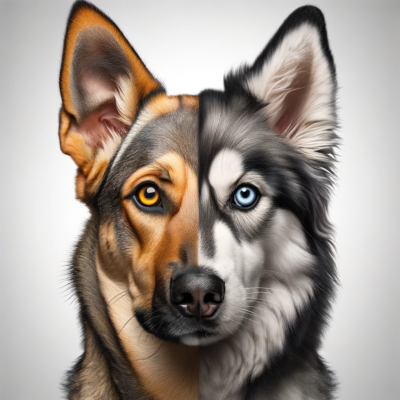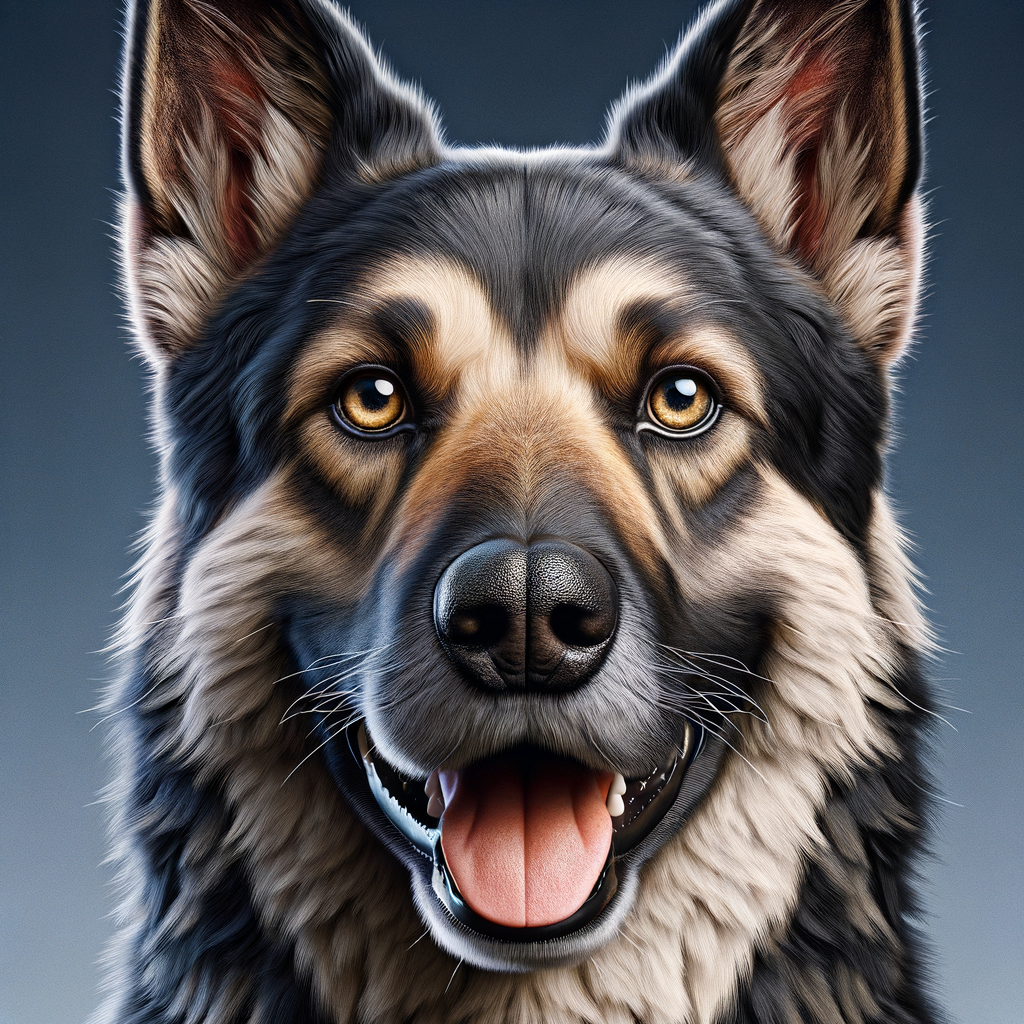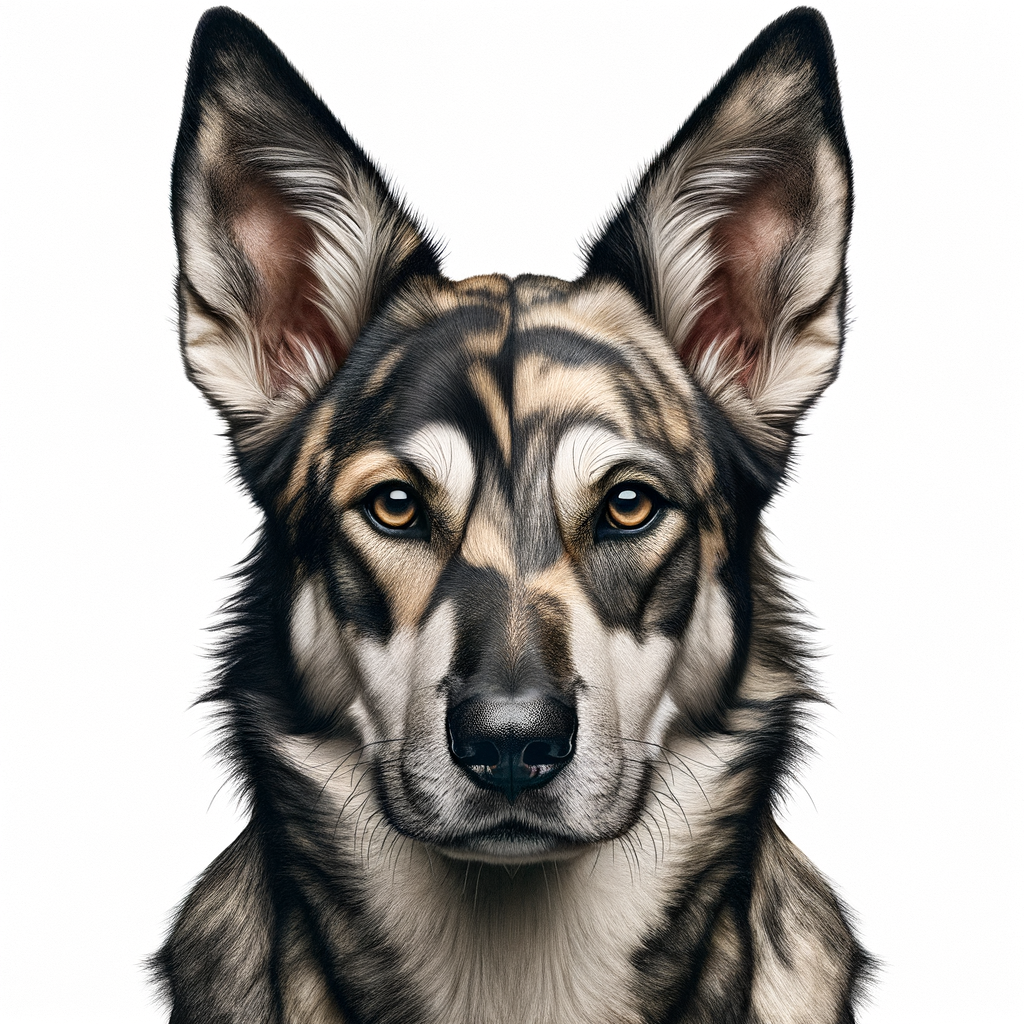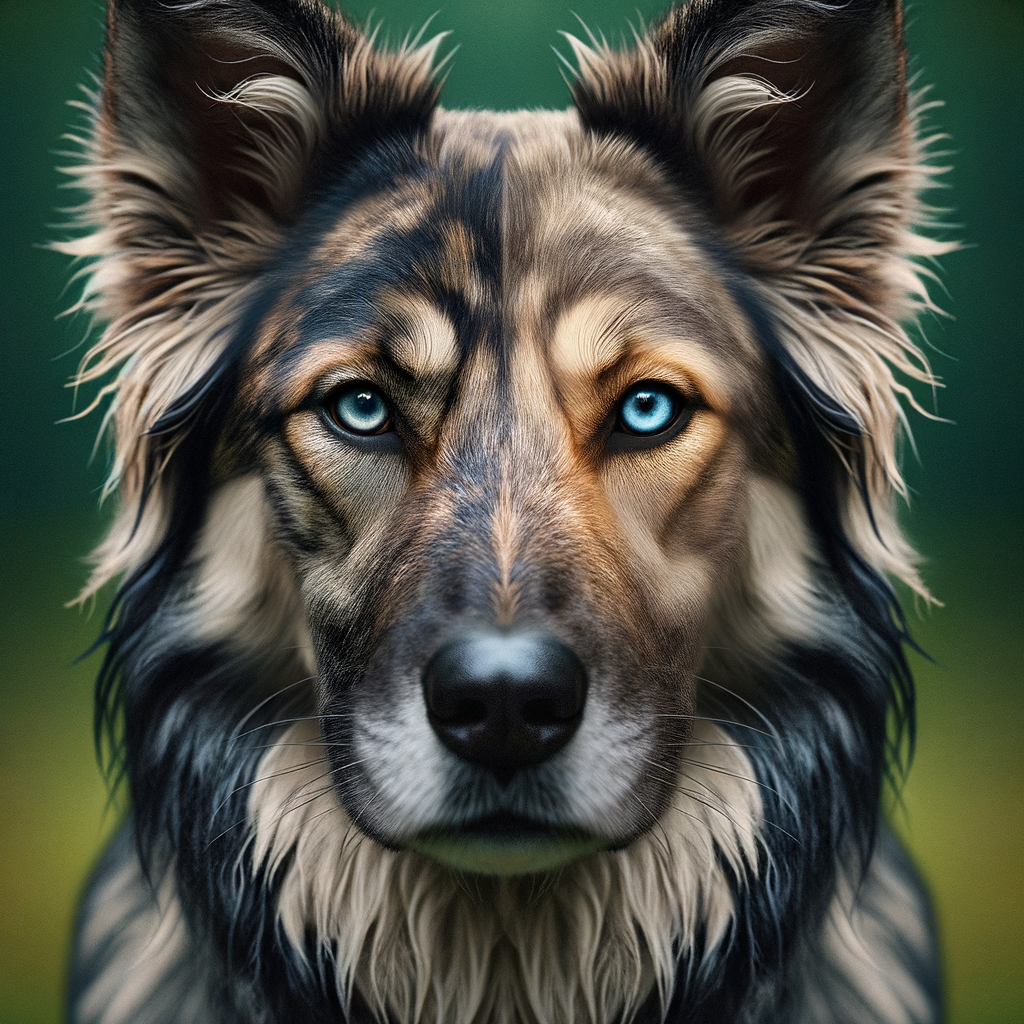Hello there, I’m Dr. Candy, a holistic veterinarian with a passion for educating pet owners about their furry friends. Today, I’ll be sharing my insights on the Dutch Shepherd Husky mix, a unique blend of working spirit and captivating charm. In this article, we’ll delve into various aspects of this fascinating hybrid dog breed, from their physical attributes to their behavior, health, and care requirements. So, if you’re considering adding a Dutsky to your family or simply curious about this breed, you’ve come to the right place!

Dutch Shepherd Husky Mix: The Dutsky’s Working Spirit
Get ready to unleash the spirited, intelligent, and affectionate nature of the Dutch Shepherd Husky Mix. This hybrid dog breed, often referred to as the Dutsky, is a delightful blend of the Dutch Shepherd’s focus and determination and the Siberian Husky’s friendly and enthusiastic personality. But what exactly does this mean for you and your family? Let’s dive into the fascinating world of the Dutsky.
General Temperament Of The Dutch Shepherd Husky Mix
The Dutch Shepherd Husky Mix is known for their friendly and outgoing nature. They are social butterflies who love being the center of attention. They are both playful and protective, making them exceptional companions for both adults and children. If you have kids at home, rest assured, a Dutsky will be their loyal friend and protector, engaging them in endless games and activities while also safeguarding them.
However, it’s important to note that their strong protective instincts should be guided properly to prevent them from becoming overly possessive or territorial. Socializing them from a young age with a variety of people and pets can help ensure they grow up to be well-rounded dogs.
Is Dutch Shepherd Husky Mix Family & Kid Friendly
Yes, the Dutch Shepherd Husky Mix is family and kid-friendly. They are affectionate and love being around their human family. Their patient and gentle nature makes them great playmates for children. However, like all dogs, it’s essential to teach your kids how to approach and play with them properly. Supervise interactions to ensure both the child and the dog are comfortable and safe.
Energy Level Of Dutch Shepherd Husky Mix
When it comes to energy levels, the Dutsky is not a couch potato. This breed is highly energetic and requires plenty of physical and mental stimulation to keep them satisfied. They will love joining you on walks, hikes, and even agility training. Without sufficient exercise, they can become bored and may resort to destructive behaviors to burn off their excess energy.
Keep in mind, though, that their high energy levels mean they may not be the best fit for everyone. They require owners who can provide them with the active lifestyle they crave. If you are a fitness enthusiast or have a family that loves outdoor activities, then the Dutch Shepherd Husky Mix may be the perfect addition to your family.
Remember, the Dutch Shepherd Husky Mix isn’t just a pet; they’re a vibrant and loving member of your family. Their spirited personality, combined with their friendly and protective nature, makes them an excellent choice for families. With proper care, love, and training, you will enjoy the unconditional love and loyalty of this unique dog breed.

Average Lifespan Of Dutch Shepherd Husky Mix
The Dutch Shepherd Husky mix, often lovingly referred to as a Dutsky, is a hybrid dog breed known for its vigor and longevity. On average, these dogs live between 10 and 14 years, which is a healthy lifespan for a dog of their size. Of course, this lifespan isn’t set in stone. Various factors can influence the longevity of your Dutsky, including diet, exercise, and overall health care.
How Diet Affects Lifespan
When it comes to the lifespan of your Dutch Shepherd Husky mix, diet plays a significant role. A balanced and nutritious diet can help maintain your dog’s overall health, ward off diseases, and increase their lifespan.
Just as it’s important for us humans to eat a balanced diet, the same goes for our furry friends. A good diet for a Dutsky would include high-quality protein sources, healthy fats, and a variety of fruits and vegetables. It’s also crucial to avoid feeding them food with artificial additives and fillers, which can lead to obesity and other health issues.
It’s worth noting that the dietary needs of a Dutsky can vary based on their age, weight, and activity level. Therefore, it’s recommended to consult with a vet to create a tailored diet plan for your pup.
How Spay & Neuter Timing Affects Lifespan
Another factor that can affect the lifespan of your Dutsky is the timing of their spay or neuter surgery. While these procedures have many benefits, such as preventing unwanted litters and reducing certain health risks, new studies suggest that early spay and neuter can lead to a variety of health problems.
Early neutering or spaying can disrupt the natural development of your dog, leading to joint and bone deformities. It can also cause hormonal imbalances that can increase the risk of chronic diseases such as thyroid problems and Cushing’s. Furthermore, early spay and neuter have been associated with an increased risk of certain types of cancer.
This doesn’t mean you should avoid these procedures altogether. Instead, it’s about finding the right timing. Many vets now recommend waiting until your dog has fully matured before considering these surgeries. Always consult with a trusted vet to determine the best course of action for your Dutsky.
In conclusion, the lifespan of a Dutch Shepherd Husky mix can be significantly influenced by factors like diet and the timing of spay or neuter surgeries. As a Dutsky parent, your role is to provide them with a balanced diet, regular exercise, and appropriate health care to help them live a long, healthy life.
Should You Rescue Or Purchase A Dutch Shepherd Husky Mix
When deciding to add a Dutch Shepherd Husky mix, often referred to as a Dutsky, to your family, it’s important to consider whether to rescue or purchase from a breeder. Both options have their unique benefits and should be carefully weighed based on your individual circumstances and preferences.
Benefits of Rescuing or Adopting
Choosing to adopt a Dutsky from a rescue organization can be a rewarding and fulfilling experience. Here are some reasons why you might consider this option:
- Helping a dog in need: By adopting, you’re providing a loving home to a dog that may have been abandoned, mistreated, or simply in need of a new home.
- Cost-effective: Adoption fees are generally less expensive than buying a puppy from a breeder. These fees often include initial veterinary care, vaccinations, and spay/neuter procedures.
- Potential for a mature dog: Many rescue dogs are adults, which means they may already be house-trained and have some basic obedience training. This can make the transition easier, especially for first-time dog owners.
- Supporting animal welfare: Your adoption fees help support the rescue organization in their mission to care for and rehome dogs in need.
Benefits of Buying
On the other hand, purchasing a Dutsky from a reputable breeder also has its advantages:
- Knowledge of the dog’s history: Breeders can provide detailed information about the dog’s lineage, health history, and temperament, which can be beneficial for predicting future health and behavior.
- Early socialization and training: Reputable breeders often begin socializing puppies and introducing them to basic training at a young age, which can lead to well-adjusted, trainable adult dogs.
- Health guarantees: Many breeders offer health guarantees for their puppies, ensuring that they’ve been tested for certain genetic conditions common in Dutch Shepherds and Huskies.
Whether you decide to rescue or purchase a Dutch Shepherd Husky mix, the most important thing is to ensure that your new furry friend comes from a place where they’ve been treated with love and care. Both rescue organizations and reputable breeders are dedicated to the wellbeing of their dogs and can provide you with a loyal, loving companion.

Average Cost For A Dutch Shepherd Husky Mix
If you’re considering bringing a Dutch Shepherd Husky mix, often affectionately referred to as a Dutsky, into your home, you’re probably wondering about the average cost. The price can vary widely depending on several factors, including the breeder’s reputation, the parent dogs’ pedigree, and the location. On average, you can expect to pay anywhere from $500 to $1500 for a Dutsky puppy.
Why the Cost Varies
The cost of a Dutch Shepherd Husky mix can be influenced by several factors. If the puppy comes from parents who have been successful in shows or working competitions, the price is likely to be higher. Similarly, breeders who have invested in health testing and other care for their dogs may charge more to reflect these costs.
What Does the Cost Include?
When you buy a Dutsky puppy, the price typically includes the initial vaccinations, deworming, and a vet check. Some breeders also microchip their puppies and provide a starter kit that includes food, a leash, and a collar.
Additional Costs to Consider
Remember, the purchase price of a Dutsky puppy is just the beginning. You’ll also need to budget for ongoing costs such as food, regular vet checks, grooming, and training. These costs can add up to several hundred dollars a year.
What To Look For In A Breeder
When buying a Dutsky puppy, it’s important to choose a reputable breeder. Here are a few things to look for:
- Health Testing: Reputable breeders will have health tests done on the parent dogs to ensure they don’t pass on any genetic conditions to the puppies.
- Knowledgeable: A good breeder will be knowledgeable about the breed and able to answer all your questions.
- Open and Transparent: They should be open about the conditions the puppies are raised in and allow you to meet the parent dogs.
- Support After Purchase: A reputable breeder will offer support after you bring your puppy home, answering any questions and helping you with any issues that arise.
Remember, a lower price tag might be tempting, but it could also be a red flag. If a breeder is selling Dutsky puppies at a significantly lower price than average, they may not be investing in the necessary care and health testing for their dogs. Always do your research and choose a breeder who prioritizes the health and wellbeing of their dogs over making a quick sale.
Dutch Shepherd Husky Mix: The Dutsky’s Working Spirit
Training & Behavior Of Dutch Shepherd Husky Mix
If you’re considering adding a Dutch Shepherd Husky mix, or Dutsky, to your family, you should be prepared for a dog that is energetic, intelligent, and eager to learn. This hybrid breed inherits its working spirit from both parent breeds, which means it thrives when given a job to do.
Overall Trainability
In terms of trainability, the Dutsky is a breed that responds well to consistent, positive reinforcement training methods. Thanks to their intelligent nature, they are quick to pick up new commands and tricks. However, they can also be a bit stubborn at times. This characteristic is often inherited from the Husky side of the family, and it means that patience and consistency will be key during training sessions.
As with any breed, early socialization and obedience training are crucial for a well-rounded, well-behaved dog. Exposing your Dutsky to a variety of environments, people, and other animals from a young age can help to ensure they grow up to be confident and comfortable in different situations.
Crate Training Is Recommended And Why
For Dutskies, crate training is highly recommended. Not only does it provide a safe and comfortable den for your dog, but it can also aid in house training and prevent destructive behavior when you’re not at home. It’s important to remember that the crate should never be used as a form of punishment. Instead, it should be a positive space where your dog feels secure.
When introducing your Dutsky to the crate, take things slowly. Start by placing treats and toys inside the crate to encourage them to enter. Gradually increase the amount of time they spend in the crate, always ensuring they have access to fresh water and that the crate is a comfortable temperature.
Potential Negative Behaviors To Watch For With Dutch Shepherd Husky Mix
While the Dutsky is generally a well-behaved breed, there are a few potential negative behaviors to be aware of. Given their high energy levels, Dutskies can become bored and destructive if not given enough physical and mental stimulation. This can result in behaviors such as chewing, digging, and excessive barking.
Additionally, both Dutch Shepherds and Huskies are known for their strong prey drive. This means that Dutskies may have a tendency to chase smaller animals, including cats and squirrels. To manage this behavior, a secure yard and on-leash walks are recommended.
Lastly, Dutskies can sometimes be a little aloof or wary with strangers. While they are not typically aggressive, early socialization can help to ensure they are comfortable around new people.
In conclusion, with the right training and socialization, a Dutch Shepherd Husky mix can make a loyal, intelligent, and energetic addition to the right family.

Grooming Requirements For Dutch Shepherd Husky Mix
As a potential owner of a Dutch Shepherd Husky mix, it’s important to understand the grooming requirements for this breed. Let’s start with shedding.
What About Shedding
Both Dutch Shepherds and Huskies are known for their double coats, a characteristic that is passed down to their offspring. So, it’s safe to say that your Dutch Shepherd Husky mix will be a big shedder. These dogs typically undergo heavy shedding twice a year, during the spring and fall seasons. During these periods, they ‘blow’ their coats, meaning a lot of fur will be shed at once. Regular brushing is necessary to keep shedding manageable and to prevent their coats from matting.
Outside of these shedding seasons, weekly brushing should suffice to keep their coats healthy and shiny. A de-shedding tool or rake can be handy to remove loose undercoat hairs. Remember, grooming is not just about maintaining your dog’s appearance but also serves as a bonding activity between you and your pet.
Excessive Shedding May Be Due To Nutrition
Now, if you notice that your Dutch Shepherd Husky mix is shedding excessively outside their typical shedding seasons, it might be a sign of nutritional deficiencies. A balanced diet is crucial for maintaining a healthy coat. Foods rich in Omega-3 and Omega-6 fatty acids, for instance, can contribute to a healthier, shinier coat.
Excessive shedding can also be a sign of certain health issues, such as allergies or skin infections. Therefore, if you’re concerned about your dog’s shedding, it’s best to consult with a vet. They can help you determine if your dog’s shedding is normal or a sign of an underlying problem.
Stay tuned for the next section where we delve more into the nutrition and diet requirements for a Dutch Shepherd Husky mix. The right nutrition can not only improve your dog’s coat but also contribute to their overall health.
In summary, grooming a Dutch Shepherd Husky mix requires a commitment, especially during the shedding seasons. But with regular brushing and a balanced diet, you can keep your dog’s coat looking its best.
Health Of Dutch Shepherd Husky Mix
Overall Health
As a mixed breed, the Dutch Shepherd Husky mix, or Dutsky, tends to be healthier than its purebred counterparts. This is due to what is known as hybrid vigor, where crossbreed dogs often inherit the best traits from both parents and are less likely to suffer from genetic issues. However, it’s essential to understand that a Dutsky is not immune to health problems.
Generally, Dutskeys are strong, robust dogs with a lot of energy. They require regular exercise to stay in good health. Regular check-ups at the vet are also important to catch any potential problems early.
Potential Health Conditions
Even though the Dutsky is a generally healthy breed, there are certain health conditions they are more prone to due to their parent breeds. Here are a few health issues commonly associated with this breed:
1. Hip and Elbow Dysplasia: This is a common issue in both Dutch Shepherds and Huskies. It is a condition where the hip or elbow joint doesn’t develop properly, leading to pain and mobility issues.
2. Eye Conditions: Huskies are known to suffer from various eye problems, and some of these can be passed on to the Dutsky. These can include progressive retinal atrophy and cataracts.
3. Hypothyroidism: This is a condition where the body doesn’t produce enough thyroid hormones. It can lead to weight gain, hair loss, and lethargy.
4. Food Allergies: Some Dutskeys can have food allergies that can cause skin irritation and digestive issues.
To minimize these potential health risks, make sure your Dutsky has regular vet check-ups. This way, any health issues can be detected and treated early.
Remember, as a responsible dog parent, your dog’s health is in your hands. Providing a healthy diet, regular exercise, mental stimulation, and regular vet check-ups will help to ensure your Dutsky lives a long, happy, and healthy life.
Your Dutsky will be a loyal, loving, and energetic member of your family. By taking the time to understand their health needs and providing the necessary care, you’ll be rewarded with a companion who’s always ready for the next adventure.
So, are you ready to open your heart and your home to a Dutch Shepherd Husky mix? If you are, you’re in for a wonderful journey filled with love, laughter, and a lot of fun.
Nutrition & Diet For Dutch Shepherd Husky Mix
As an owner of a Dutch Shepherd Husky mix, you’re caring for a highly active and intelligent breed. Their nutritional needs are a crucial part of their overall health and well-being. So, let’s delve into some essential nutrition tips and recommended foods for your Dutsky.
Nutrition Tips From Dr. Candy
According to Dr. Candy, a renowned veterinarian, the Dutch Shepherd Husky mix should have a diet that’s high in protein, moderate in fats, and low in carbohydrates. Protein is essential for muscle development and maintenance, while healthy fats provide the energy your Dutsky needs for their active lifestyle. Carbohydrates should be complex, such as sweet potatoes or brown rice, for sustained energy release.
- Protein: Look for foods with real meat, such as chicken, beef, or fish, as the first ingredient. The protein content should be at least 22% for adult dogs and 28% for puppies.
- Fats: Healthy fats like omega-3 and omega-6 fatty acids are excellent for skin and coat health. They should make up around 5-10% of your dog’s diet.
- Carbohydrates: Avoid foods with simple carbs like corn or wheat, which can lead to weight gain and digestive issues. Instead, opt for complex carbs for sustained energy.
Always ensure your dog has access to clean, fresh water. Hydration is vital for their overall health and aids in digestion and nutrient absorption.
Best Foods For Dutch Shepherd Husky Mix
With the myriad of dog food options available, it can be challenging to pick the best for your Dutsky. Here are some top-rated options that align well with their nutritional needs:
- Blue Buffalo Wilderness High Protein Grain-Free: This food is packed with real chicken and sweet potatoes, providing the necessary protein and complex carbs.
- Wellness CORE Grain-Free: It offers a good protein and fat balance with turkey and chicken as its primary sources, along with fruits and vegetables for antioxidants.
- Canidae Grain-Free PURE: It offers a variety of protein sources like salmon, duck, or bison, making it a great choice for dogs with food sensitivities.
Remember to adjust serving sizes based on your Dutsky’s age, weight, and activity level. Puppies generally require more calories due to their rapid growth, while active adults need a diet to support their energy needs. Always consult with your vet for personalized feeding guidelines.
Wrapping It Up
Providing a balanced diet for your Dutch Shepherd Husky mix is not just about keeping them fueled. It’s about giving them the building blocks for a strong immune system, healthy skin, and a shiny coat. It’s about supporting their high energy levels while maintaining a healthy weight. But most importantly, it’s about contributing to their overall quality of life and longevity. After all, a healthy dog is a happy dog, and that’s what we all want for our furry friends.
Frequently Asked Questions
What is a Dutch Shepherd Husky Mix?
A Dutch Shepherd Husky Mix, also known as a Dutsky, is a hybrid breed that combines the traits of the Dutch Shepherd and the Siberian Husky. They are known for their energetic nature and working spirit, making them excellent companions for active families.
What are the characteristics of a Dutsky?
The Dutsky is a large, powerful dog with a strong work ethic inherited from both parent breeds. They are typically intelligent, loyal, and have a high energy level, requiring plenty of exercise and mental stimulation.
How much exercise does a Dutsky need?
Dutskies are high-energy dogs that require a significant amount of daily exercise. This can include long walks, runs, playtime in a secure yard, or mental stimulation through training and interactive toys.
What kind of temperament does a Dutsky have?
Dutskies are known for their friendly and outgoing nature. They are often good with children and other pets, but their high energy level and strong prey drive may make them too energetic for some families or households with small pets.
What kind of grooming does a Dutsky require?
The Dutsky typically has a thick, double coat that requires regular brushing to keep it healthy and free from mats. They are also known to be heavy shedders, especially during the change of seasons, so frequent grooming is necessary to manage shedding.
Dr. Candy, a holistic veterinarian and certified raw dog food nutrition specialist, graduated from Oklahoma State University in 2009 with a DVM and has since specialized in companion animal nutrition, advocating for species-specific diets. With a background in wildlife rehabilitation and oil spill response, she combines holistic health and conventional medicine in her unique approach to treating chronic diseases, allergies, and autoimmune conditions in pets. As the owner of a veterinary practice in Colorado and an author, Dr. Candy is dedicated to educating pet parents and improving the health and happiness of animals.




